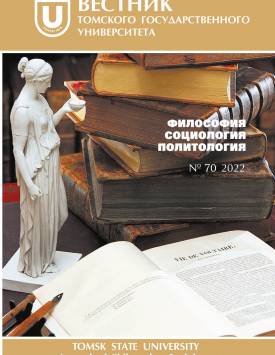Partiality, impartiality, and the phenomenology of moral experience
One of the main focal points of the recent discussion on the possibility to justify moral partiality (special permissions and obligations) is the phenomenological objection. Simon Keller transformed it from the objection against the inference of special permissions and obligations from the impartial treatment of all persons into the touchstone for every justification of moral partiality. In his opinion, the projects view and the relationships view also do not pass this test. An agent who contributes to the well-being of her nearest and dearest does not do it because she is afraid to lose the possibility to fulfill her personal project or to maintain her relationships with a particular person. She does it immediately for the sake of her nearest and dearest. This is the basis of Keller’s own justification - the individuals view. Though this attempt to avoid the phenomenological objection is not impeccable. To retain the tie of the individuals view with impartiality, Keller considers close relationships between individuals not a moral reason but an enabler of moral reasons. This position gives rise to substantial contradictions. Some supporters of the individuals view try to smooth them out through giving close relationships a status of an intensifier of moral reasons. Their answer to the phenomenological objection is following: the motives of moral agents should include only reasons to act, but not every factor that changes the deontic status of an action. So the fact that relationships intensify moral reasons and the fact that the cause of this intensification is that relationships contribute to agent’s good life can be rightfully absent from her consciousnesses. There is a serious problem with this argument. The reason of partiality in the modified individuals view is an equal value of every person intensified in the case of someone nearest and dearest. If only reasons should be present in the consciousnesses of an agent, then special permissions and obligations turn out to be unjustified. If, on the contrary, her motives should reflect all the process of intensification, then she becomes a person who acts to contribute to her good life. According to the phenomenological objection, it is a wrong reason. The other way to avoid the objection relies on the unity of interests of an agent and her nearest and dearest. It is also vulnerable. So for now the phenomenological objection to justifications of moral partiality creates a complete theoretical impasse. The author declares no conflicts of interests.
Keywords
morality, ethics, impartiality, partiality, special permissions and obligationsAuthors
| Name | Organization | |
| Prokofyev Andrey V. | Institute of Philosophy, Russian Academy of Sciences | avprok2006@mail.ru |
References

Partiality, impartiality, and the phenomenology of moral experience | Tomsk State University Journal of Philosophy, Sociology and Political Science. 2022. № 70. DOI: 10.17223/1998863X/70/19
